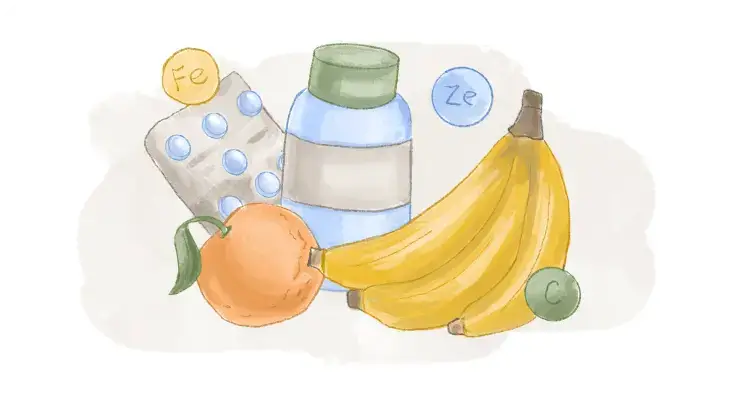Not getting enough nutrients, being depressed, or having certain medical conditions like cancer can make you lose weight without wanting to.
Before we kick things off, here’s a quick heads-up: This isn’t about guzzling mysterious weight potions that’ll turn you into the Hulk overnight. This is about getting some au naturel gains with the help of good old vitamins and dietary supplements. Let’s amp up those calories the right way, shall we?
Disclaimer: Remember, this content is informational and not a substitute for professional medical advice or treatment. Consult a healthcare practitioner before starting any new supplement or nutrition program.
Do supplements and vitamins make you gain weight?
Vitamins are micronutrients that your body needs to do many things, like metabolism, energy production, and tissue repair. Even though vitamins do not give you calories by themselves, many of them work as coenzymes (building blocks) in metabolic processes that can help you gain weight.
Supplements may also help you gain weight because they contain a lot of calories and nutrients in a small amount of space. But you should not eat them instead of whole, nutrient-dense foods; their purpose is to add to your diet. Also, be aware that some of them have side effects, so it’s better to consult with your health provider.
8 supplements and vitamins to gain weight
1. Vitamin C
Let’s start with the obvious. Almost everyone knows that vitamin C, an antioxidant, is important for keeping your immune system healthy. But does vitamin C make you gain weight? Yep. You can gain weight with vitamin C because it can slow down your metabolism. So not only does it help protect your body, but it also makes you gain weight.
2. Creatine
Creatine is like the Pikachu of supplements: small but mighty. Because it can improve exercise performance, creatine may have an indirect effect on gains in lean muscle mass.
How it works? Taking creatine as a supplement raises the amount of creatine in your muscles. By doing this, you may improve your performance and build muscle over time.
But most creatine supplements are low in calories and need to be mixed with other ingredients to make them high enough to help you gain weight.
3. Omega-3 Fatty Acids
These slick supplements will not only help your heart and brain feel better, but can also give you the calories you need to gain some plush padding. They’re the good kind of fat — what we like to call “phat.”
4. Iron
Want to say goodbye to fatigue and hello to stamina? Iron’s your guy. This nutrient is crucial for blood health and can help you gain weight. But also, studies suggest that iron treatment is also related to weight loss. Confusing. Just don’t go full Iron Man unless you’ve got the suit to match 😀
5. B Vitamins
From energy production to creating new blood cells, these vitamins are tiny cheerleaders boosting your body’s vibe from the inside out. B is a weight-gaining vitamin that makes you hungry and makes you eat more. They also help your metabolism, which includes making energy and using nutrients. It is cool!

6. Amino Acids
Amino acids are like the snacks your muscles munch on during an HBO marathon. Branched-chain amino acids (BCAAs), in particular, aid in muscle recovery after workout and growth—so you can say “see ya” to feeling like an overcooked noodle post-workout.
7. Protein Powders
Typically, protein is the building block of muscle. So, if you’re looking to gain, these powders can be your best friend. Actually, studies show that diets high in protein might help people lose weight since protein makes them have a full stomach.
8. Weight gainers
It is clear from the name. This supplement has a lot of calories, which is supposed to help you gain weight. In general, they work and really help you gain weight, but they do have some side effects and do not work for everyone.
A word from Breeze
To sum up, fellow Aspiring Avengers, taking a lot of these vitamins and supplements might be just what your body needs to gain weight. Prior to taking pills like candy, you should always talk to a medical professional.
Also, remember to have compassion for yourself and consider the big picture when it comes to your health goals. To help you keep a calm mind, discover your mental well-being profile with a free test from Breeze and get your personal plan to help you feel your best.
Disclaimer
This article is for general informative and self-discovery purposes only. It should not replace expert guidance from professionals.
Any action you take in response to the information in this article, whether directly or indirectly, is solely your responsibility and is done at your own risk. Breeze content team and its mental health experts disclaim any liability, loss, or risk, personal, professional, or otherwise, which may result from the use and/or application of any content.
Always consult your doctor or other certified health practitioner with any medical questions or concerns
Breeze articles exclusively cite trusted sources, such as academic research institutions and medical associations, including research and studies from PubMed, ResearchGate, or similar databases. Examine our subject-matter editors and editorial process to see how we verify facts and maintain the accuracy, reliability, and trustworthiness of our material.
Was this article helpful?



